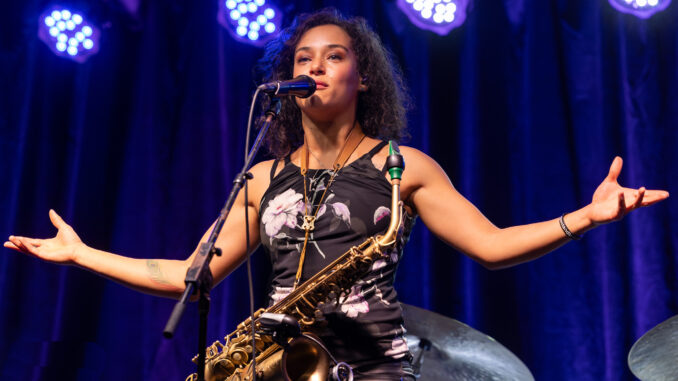
Be daring, be yourself, be willing to take risks and stand alone.
Vanessa Collier’s music is gritty, raw, and at times, either downright sad or bubbling happy. As with most songwriters worth their salt, her songs transition through a multitude of emotions centered on lived experiences. She’s been compared to Bonnie Raitt, Susan Tedeschi, Sharon Jones and Aretha Franklin, none of whom play saxophone, but they do sing pretty well. Besides the sax and soulful vocals, Collier also plays guitar and writes her own material, some of it very personal as in ‘Two Parts Sugar, One Part Lime,’ a honky-tonk song about growing up in a town with a mean streak, featuring an outstanding romp on keys by Charles Hodges and some nice guitar work by Laura Chavez. Both musicians have had steady roles on Collier’s six albums and strenuous touring schedule.
Collier spends much of her time on the road, performing at some of the most prestigious music festivals in the world as well as venues throughout the country. Her songs run through soul, roots and gospel that she braids into one vibrant strand as if it were the hair of one of her sisters. “I am driven to make music because I find it the best form to express myself and connect with people,” she asserts. “I love being on stage and feeling the energy and joy of the audience.”
Collier is a force on stage, certainly, but also on her recordings. The songwriting is stellar, the command of the saxophone above standard, and her voice is a perfect fit for the songs. She picked up her first saxophone at age 11 and began soloing over a blues record. She studied the sax extensively with Chris Vadala, a distinguished professor of music at the University of Maryland, then attended the Berklee School of Music where she not only graduated with honors but also played at her commencement backing Willie Nelson and Annie Lennox.
On 2014, Phenix City Records released her debut, “Heart Soul & Saxophone.” Touring all over America and Europe with Joe Louis Walker for two years prior rounded out the learning stage of her training to be a recording artist. It also opened her eyes to other societies, notably different in countries like Turkey.
Her sixth and latest record is “Do It My Own Way,” a very apt title. It is sonically inspired by the classic Memphis soul of Stax and Volt records, especially that of the Staples Singers. Talking about the album, Collier offers, “It’s a warmer and darker sounding record, recorded intentionally to reflect a throwback to older school soul, R&B, blues, and to the days of great songs and songwriters, tube amps and analog gear.”
The gospel-tinged ‘Rosetta’ pays tribute to one of Collier’s heroes, electric guitar pioneer Sister Rosetta Tharpe. “She’s carried the torch so I can see a little bit better… There’d be no Elvis or Chuck Berry. Sometimes the women do it best. She tackled all the inequities. And fought with strength and audacity.” Her admiration for Tharpe is on full display as well as her versatility on the album closer ‘Warrior,’ which kicks off on resonator guitar before the full band joins in. The song paints the picture of a powerful woman and is both a universal message about the strength and experience of women and a tribute to Collier’s mother.
Speaking of “Do It My Own Way,” Collier spoke of the title as something of a diary of her life to this point. “This record is a journal of some of the lessons and discoveries that I’ve encountered along the way.” In this interview, she talks about some of those discoveries that have informed her musical story.
Hello, Vanessa. What’s going on in South Carolina? I read you’ve moved around quite often.
I still have young sisters, and the oldest one just turned 18 in November, so I kind of wanted to stay close. My mom moved down here. She’s at the University of South Carolina in Columbia. We moved to Hershey, Pennsylvania for a year, and then Maryland between Baltimore and DC. Just outside of Philly for another 10, 12 years. Massachusetts.
How did you come to be a sax player?
I saw it on a TV show. It was a half hour sitcom that I used to watch after school, and one of the episodes, the dad pulls a tenor saxophone out of the attic and starts playing it, and I just fell in love with the sound of it. I didn’t even know what that instrument was. I got to find out. I think it was the summer of my third-grade year, and so fourth grade, you could start a band instrument. I took to it quickly. And then I was very fortunate to grow up in an artistic community, in an upper-middle-class, kind of affluent area where they have the excess funds to put into the arts program. So, I had ample opportunities to be in all sorts of different kinds of bands.
What was your first band?
I started in the concert band, then moved up to the wind ensemble. In sixth grade, we had a jazz band start at 6:30 in the morning to get me out of bed early to play an instrument. You got to love it, you know? Then through high school, I did a marching band. I did the pit orchestra, I did the All-state bands, everything I could possibly do, I got to do. My middle school band director was a session player in LA who happened to know this guy, Chris Fiala, who, at the time when I met him, had been on the road with Chuck Mangione for 20-plus years. And he was first call for the National Symphony Orchestra in DC. First call when Stevie Wonder needed horns coming through town, or Aretha Franklin, BB King. His credits were crazy, right?
They were spanning jazz, funk, soul, R&B, anything you could possibly do with a saxophone. My middle school band director basically just bugged him until he auditioned me. Finally, he took me on as a student in seventh grade. That was the bulk of how I learned the instrument, and learning the joy and the passion and all the things you can do with the horn, all the different ways to approach it. We did classical, we did funk, we did soul, we did everything.
So you did Americanafest this year. How did that go for you? What was the reception like there?
It was great. We ended up in a small club, kind of off the main drag, but of course, there’s always a lot of big things happening there. The people that we had there were enthused, and it’s always an interesting thing to hear a saxophone, you know what I mean? It’s not usually a main instrument. You’ll hire a horn section, but to have that front and center, it always seems to take people by surprise and either you love it or you hate it. But it’s all good.
You also did the Chicago Blues Festival, which is a pretty big deal.
I’ve been building my name in the blues world for 10 years now, and I think that was a large part of it. But you always have to have the right connections, and my booking agent was connected with ’em. So that was definitely a bucket list thing for me.
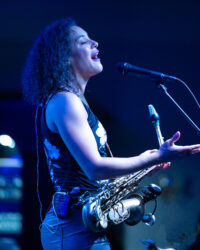
Outside of that, what would be your dream gig?
I mean, there’s so many. I haven’t played Jazz Fest in New Orleans yet, and I would love to do that. I would love to play Red Rocks, maybe the Beacon Theater. There’s a ton of places on the West Coast, obviously, But I’m always happy to play anywhere, really.
You do tour a lot.
The last year was a hundred. The year before that was 135. We’re somewhere in that 100 to 150 show range per year. As part of the record release tour, we did some dates opening for Blues Traveler, and I’m not used to that. I usually love to do my own thing. Being the opener, 25 or 30-minute slot is always too short. But they actually allowed me to stretch out and do about a 50 to 55-minute set, so I could get into some stuff and have some nuance. One of my favorite venues that we played was this new spot in Omaha, I think it was called The Steel House. It’s big, around 1200. Audience was super receptive.
When playing gigs, do you like it better when people are able to stand so they can move around, especially if the music makes them feel like dancing?
Absolutely. I know people seated get upset when people stand up and dance and whatever, which at Blues Traveler shows, that’s not really a problem because everybody’s up and nobody really cares. But I always like when people move and they feel the music and feel free to do so. We do play some theater gigs, and theater gigs are great because you have an audience that wants to listen to the lyrics, and I’m big on songwriting. It’s like those songs hit differently if you’re actually listening to the purpose of them. The flip side is when you play a festival gig and people can actually dance and move, some high-energy stuff, it’s just a whole different experience.
Besides your own tour, have you gone on tour with anyone else?
There’s Joe Louis Walker. He’s in the blues world and grew up in the gospel world. My last year of college, I started touring with him on the weekends up and down the East Coast, mainly. Then we did a month-long tour in Turkey. That’s how I got my feet with the touring world.
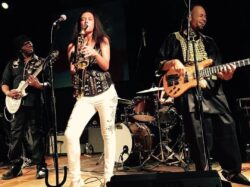
Turkey seems like a whole different world from America? What was your impression?
It was like one of the best tours I’ve ever been on. One of the things that I love about touring in Europe is pretty much everybody else takes care of the logistics as opposed to here in the States, where I take care of all that. And food is amazing. The people were great. I thought the language was kind of cool, and we were doing these big shows and being transported on this big bus with a whole video crew. The one that I remember the most was when we played on the border of Syria and Turkey, so we had these armed guards with machine guns escorting us because it was a dangerous time to be over there. That show was mainly for the relief workers in the area. Joe was talking to me about women in this area, that they don’t get to do what we do. So, the fact that you’re here and you are part of this band is threatening. I sang backgrounds and played percussion and saxophone. Talking to some of the relief workers afterwards, they say we needed this, we’ve been really down. There’s a lot of loss in the area.
Was Walker on tour promoting a particular album?
It was 2012, and I believe it was “Hellfire.”
You went to Berklee in Boston, like many musicians do. What was your major?
I got there thinking I would be a saxophone performance major, and within the first week, I decided to do a dual major – saxophone performance and music production engineering. I got my feet wet in all the realms, and it served me well, just kind of knowing what sounds I want to go for and knowing how to speak to someone who speaks the language.
Was there a particular teacher or student that was instrumental in moving your career along?
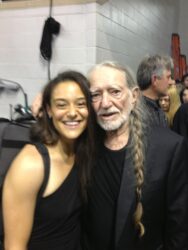
Absolutely. There’s a guy, he actually just retired, but his name is Steven Weber. And Marty Walsh, who’s a guitar player. I ended up being his horn contractor for about three and a half years. When he had a recording session, he would basically call me to get the horn section together. I would line up the people, depending on six-piece horn section, four-piece horn section, whatever it needed. I did that for three and a half years, and that was invaluable experience, really, to get to work with people and make sure they show up on time and everything’s communicated.
Best Buy was a venue right on the corner of Boylston and Newbury, where the old Tower Records used to be (in Boston). I booked a show there, put a band together, did a bunch of cover songs, sang some. Three of my professors came out from the music production department, and one of ’em was Steven who really guided me into a lot of things. He took me to China, 10 days in Beijing and Shanghai, doing a cultural exchange with students over there and playing shows. I played sax and EWI and sang with four DJs, which was a whole completely tdifferent thing than I’m used to playing with a full band. Then he took me to Hawaii, and we did two weeks in Kauai doing their jazz festival.
With all the effort put into playing, has songwriting been a challenge for you, finding the time?
Yeah, sure. I think my songwriting has changed a lot. I used to have a ton of time, and so I started writing songs in college and did it for class. But when I got on the road, I was teaching three days a week, and I had a two-hour commute each way. I’d sit without the radio on, and then these ideas would pop into my head, I’d voice record it, then go home and try and figure out a tune. Now it’s like I tour so much. Really, the challenge is finding enough time to sit down where I’m not having to figure out logistics so I can get into the creative space, finding time for that every day.
What should people who aren’t familiar with your music but are Americana fans listen to that would interest them?
I think the latest record, depending on how you like your Americana, you could pick anything on there. Most likely, they might like ‘Warrior,’ which is the last song on the record. I wrote it for my mom, or about my mom and her legal battle with a major university here in the US. I’m playing resonator on it, so there’s no saxophone other than the horn parts that I wrote for it. I meant this record to be a little bit more homey and a little bit more soulful and well-rounded than some of my other stuff.
Your latest record, it’s got that Stax/Volt horn sound. It’s a little different from your previous albums.
On the other records, I heard all these different parts. This one, it just felt like it needed to be simple, but also really poignant and intentional. So, I pared everything down. Usually, I’ll put soprano, alto, tenor, five parts on it or whatever. And on this one, nah, I think I’m just going to do tenor, alto, trumpet. That grouping just serves this style well. It had some of the Sharon Jones & The Dap Kings sound.
That’s definitely in it. And I’m thinking even older, in the Junior Walker style maybe.
Oh, I’ll take that. I love Junior Walker. Absolutely. I was going to say I loved the old Staple Singers stuff, and Al Green, a lot of the stuff from Memphis and Detroit. That was sort of my vibe, I guess, for this one.
‘Wild As a Rainstorm’ is a really soulful song, and the lyrics were interesting, too. Would you talk about that song and where it is coming from?
I think I’m always inspired by having younger sisters, and there’s four of us with sixteen years between me and the next one. I’ve seen them grow up through eyes more like a guardian, you know what I’m saying, than a big sister, because I was in the house only for two years. I think watching them go through the same things that I had to go through in the world, making you feel very inadequate and having this pressure to appear to be beautiful all the time. And then just being forced, or led into this. You can only do this. This is what we do. I have been very fortunate to be able to direct my career. I’ve gotten a lot of opportunities from other people, but on the whole, every decision has been mine.
I think that’s a rare thing as an artist to be able to do. And it’s a scary thing because you don’t know if anybody’s going to accept that. But ten years in, it’s like I found a niche of people that accept it. So, my whole idea behind ‘Wild as a Rainstorm’ is, it’s sort of a love letter to the next generation of girls that everybody’s saying, you can’t do this. If you know in your heart and in your soul that you are meant to do something, you just try it. You’re allowed to fail. What is failure, right? It is just a word. If you try something and it doesn’t work, you can pick yourself back up and go down a different path. Just be daring, be yourself, be willing to take some risk and stand alone. I think you learn so much more about yourself, and you learn so much more about the world, that it’s not quite like that. It doesn’t have to be that way. There is space for you.
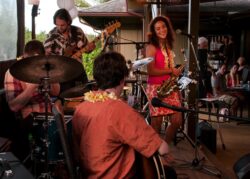
‘Warrior’ is the final song on the album. So again, it seems your mother is involved in the lyrics.
Yeah, that one’s her. It talks about me watching her over the last five years. My mom is a very strong person, and she’s someone who almost can’t help herself when something’s wrong, when something is not correct in the world, and there’s injustice. She cannot sit by and let it happen. And she stands up all the time to her detriment. In this case, what happened is that she took a stand. The university decided they did not want her around and denied her tenure, which she had earned under certain criteria that she was hired. Everyone knew that it was wrong. And there are all these levels of redress where you can challenge that and have them overturn it. There’s faculty welfare and privileges. There’re all these opportunities to have someone else outside of the department look at the case and go, there’s something wrong here.
There are people that wrote dissents all the way up. But what we found is that there’s corruption on every level. Somebody’s worried about losing their job, and so they make these decisions. It basically ended up where my mom, who’s essentially a single mother with three kids all under the age of 16 at that point, and in the middle of Covid, where there’s a hiring freeze, is now jobless, and it shouldn’t be that way. Then she took up a legal battle, which has lasted five years of trying to navigate the court systems and having to go through so much, being the David in the story of David and Goliath. She’s the little one, the small person, and they have the deep pockets. That is what the justice system tends to propagate. So, that’s mainly what those lyrics are. Just watching that process and how it’s so unfair. It’s not right, and she deserves that job. We uprooted our whole life. And just the devastation of one small injustice has been amplified at every single level to become this huge devastation for us.
‘Rosetta’ I am guessing is for Sister Rosetta Tharpe?
Oh, yeah. I was always surprised when I was growing up nobody talked about her. I happened to find her by chance. I was at a friend’s house in California, and she had this book, “Shout Sister Shout”, on her bookshelf. I was bored and started reading it, and I’m like, this Sister Rosetta, what? I read that she was in an unmarked grave outside of Philly until 2013. All these things that this huge influential person on rock and roll and music history not really getting her do, which now she has kind of posthumously. She’s been inducted in the Rock and Roll Hall of Fame, which is great to see. It’s amazing to hear her music. She comes from the gospel background and then kind of shaped a new sound out of that.
So, it portrayed the sexism in the music industry. In practical terms, how did that affect you?
I’ve seen its effect from the start of my career to now. It’s kind of ingrained in the system. One of the more recent examples of this is at this big festival in 2021. I won’t name it, but much of the lineup is guys playing guitars. They were trying to add me and another female artist. I had an eight-hour drive, and they wanted us there at 11:00 a.m. It was a festival I’d played before, so I’d kind of paid my dues, and I just wanted to shift a little later so that we didn’t have to drive through the night, very dangerous on no sleep. And at that point, I had grown in my career where I didn’t feel afraid to ask for that, but then it would have put us backed up against another female artist. Basically, the promoter said we can’t have two female artists back-to-back. We just can’t do it. The other artist plays guitar. I play saxophone. The shows could not be more different, but the idea is we’re more of a commodity. We are more of like, oh, it’s the flash, so that’s a big one. There are inappropriate things like little tiny thin women that dress to catch your eye, sexy and so forth. With guys in country, if you wear a cowboy hat and jeans, they like that, but it’s not quite the same thing with women.
It’s like watching TV news. It amazes me that guys are always in nice suits, but the women are, a lot of times, they’re in dresses you might wear to a cocktail party.
That’s what I’m talking about.
Do other art forms inform your music: literature, film, dance, painting?
I grew up reading a lot of books and loving my English class. I read a lot of psychology. As a songwriter, you kind of need it. But I love fiction as well. I love dystopian literature in general.
What have you read lately that you liked?
I don’t know if you’re familiar with the “Thursday Murder Club” series? It has blown up. I just finished the third book, but it’s basically just a bunch of people at a retirement home in the UK, and they get together and try and solve cold cases. They end up solving them somehow someway. I’ve also read a lot of Michael Pollen, and I have been making my way through one of his, “This Is Your Mind on Plants.”
One of your earlier albums, “Meeting My Shadow,” had one of your best songs, ‘When It Don’t Come Easy.’ Very evocative lyrics like, “There’s a hook nose man hiding in the craters of the moon.”
That remains one of my favorite songs I’ve written. That and ‘Wild as a Rainstorm’ are my two favorites. Shadow came out of a really, really dark time for me, honestly. I have had some personal issues with band stuff that came crashing down, and it felt like the end of my career. I just ended up writing. I wrote this whole record. I was in upstate New York looking at this lake and noticing that the water can be peaceful, but it can also be raging, and it wears away through that peaceful lapping at the shores, wearing away the rocks. And I thought that’s such a beautiful metaphor for life, because it’s not about always powering through and being the waterfall that’s going to submerge someone, but it is about cutting through slowly all your troubles and finding peace as much as you can. You just got to keep going through the tough times.
Laura Chavez was on that album. She’s been a regular on your recordings.
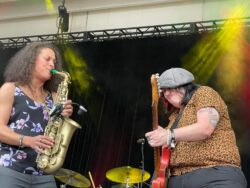
She was in the studio band that the record label hired for that one. She’s been playing guitar on every record since.
‘Poison The Well’ sounded like Clapton when he was with Cream, with that wa-wa guitar. That was Chavez. Tell our readers about that song.
It is coming out of the feeling like the people around me had poisoned the well. You can have a problem with one person, but if they poison the well, you now have a problem with everybody. Right? How I felt at the time was there were a lot of people in the band that didn’t believe in me. They thought they were doing me a favor, and they were actually all my close friends. It hurt pretty deeply. You can’t really move on with those same people. You have to move on to a different well that’s not been poisoned.
What’s a genre or an album or an artist that you like that would surprise people?
I think it’s the Wood Brothers. They put on the best live show I’ve ever seen.
How do you prepare when you’re going to do a live show? Any particular things you have to do? Not necessarily OCD, but something you do to prepare for a show.
I really like doing vocal warmups. I see a lot of merit in them now. I’ve done a lot of work since the pandemic of working on vocals, taking vocal lessons every Friday for the last four or five years. So, getting to feel where the voice is at every day, because it’s totally different from day to day. So, if I’m on an 11-day run, it’s like, day one might be great. Day nine might be great, day seven, I might have slept in a dry room. There’s so much that influences the voice. Some nights I can sing lighter if I have to, so that’s become really pertinent for me when I’m about to hop on stage. It’s just simple, woo, kind of like, where are you?
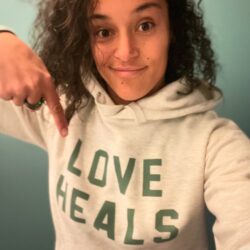
If you didn’t work in music, make your living in music, what would you do instead?
I have thought about this quite a bit. I love working with dogs. I have two herding dogs, so you have to stimulate their mind. Otherwise, they tear up your house or they go crazy or both. And so I’ve taught one how to back up and speak on bark, on command down, turn left, turn right, all with voice control without heel, all the normal things. And so it’s really fun to shape them and see each dog does have a different personality, a different learning style. So having to figure out each dog and tailor your approach. It’s so much about body movement. It’s almost like stage performance to me. It’s like if you do this, it indicates this to a dog. So really, you start to get more clued into what you’re doing with your body.
What are the lyrics you associate with the lowest time in your life?
For me, that would be “When It Don’t Come Easy.”
How about the opposite, the best time in your life?
That would probably be, let’s see, I’m trying to think. I have this whole playlist, ‘ Forget Me Not’ by Patrice Rushen. It’s really just for the groove, but I would put that on there.
What is your guilty pleasure cover song?
I think it’s ‘You Can Leave Your Hat On.’ We haven’t played it live. I put it on a record in 2020.
What would be your dream for the future?
I think my dream is always just any opportunity where I can fully express myself. So for me, that has been just continuing to make music that makes me happy and fully expresses who I am.


